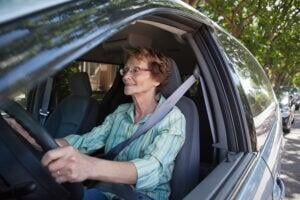Becoming a caregiver for a loved one is often confusing and emotional. Taking care of someone who once cared for you presents difficult decisions and painful conversations. One of the most challenging conversations that caregivers have to have involved the senior’s ability to drive safely.
Before you make a serious decision like taking keys away, you will want to clearly understand the dangers of driving for your loved one. Many different signs might be present when the time comes to a stop your senior adult from going anymore.
Increased Dents, Scrapes, or Accidents
One of the most obvious signs of danger when driving can be found in the car. If you notice a few fresh dents or scrapes, then it is likely time to have a conversation with your loved one. Many senior adults will hide “minor” accidents from their caregivers to retain their independence.
Driving Violations
Another sure-fire sign that your loved one is nearing the end of their driving career is multiple vehicle violations. Speeding tickets, traffic violations, and even parking tickets can signify that your loved one is experiencing issues while driving.
Eyesight is Deteriorating
If your loved one seems to be struggling with a decline in vision, then it might be a good idea to have their eyesight checked. Deteriorating eyesight is a normal part of aging. However, when vision becomes an issue for the elderly, it can make it more difficult to trust their ability to drive a car.
Further, if you notice that your loved one begins to worry about driving at night, this is a key indicator that it might be time to hang up their keys. Difficulty seeing at night can be a sign that there are underlying eyesight issues.
Being able to see well enough to drive is also not limited to the accuracy of eyesight. Many aging adults experience a phenomenon that shortens their height significantly. If you notice that your loved one is struggling to see over the steering wheel, it is a good idea to have a discussion about their ability to drive safely.
Anxiety, Stress, or Confusion about Driving
Caregivers often have to pay close attention to loved one’s slight behavior changes in order to understand what is happening. If your loved one begins to get frustrated, anxious, or seems more confused, then it might be time to investigate their driving habits.
Anxiety and stress relating to driving can often cause aging adults to experienced increased driving distractions. This can lead to a delayed reaction time or even accidents.
Multiple Family Members Notice
If multiple family members are beginning to notice concerning behavior while your senior is driving, then that suggests that there are consistent problems. On a positive note, having multiple family members that agree with the decisions makes the no driving conversation a little bit easier to tackle.
Final Thoughts
Taking care of your aging loved one is complicated. There are a number of conversations that are difficult to have. Although it is a difficult conversation to explain the need for a loved one to stop driving, it is a critical conversation. Keep in mind that your loved one’s safety is not the only concern, there are other people on the road who may be affected during an accident.
If you or an aging loved-one is considering in-home care in Nevada please contact the caring staff at Essential Care today at 702-745-0255









